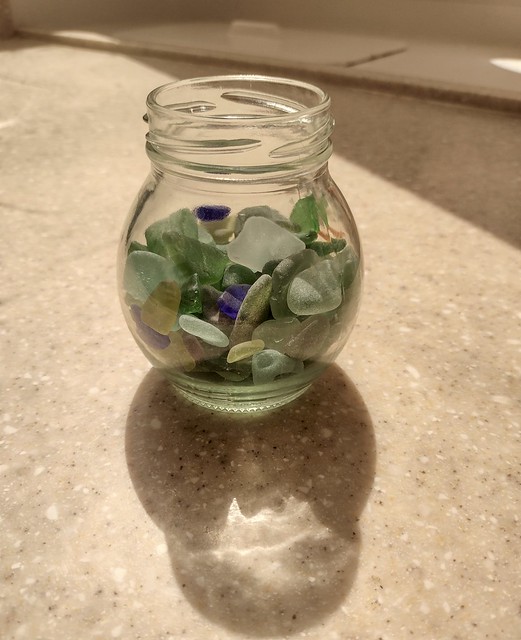While we’ve been “holding station” and busily working on Take Two’s water tanks, launching our teenagers, homeschooling, and making a living, I’ve also been writing something new. My morning routine (based on Hal Elrod’s book,The Miracle Morning) has been so beneficial that I want to share an entry from my daily journal, which is slowly becoming a new book of daily readings, Deep Calls to Deep (working title). Here’s a sneak peek:
“But we have this treasure in jars of clay to show that this all-surpassing power is from God and not from us. We are hard pressed on every side, but not crushed; perplexed, but not in despair; persecuted, but not abandoned; struck down, but not destroyed.” —Paul’s Second Letter to the Corinthian Church (chapter 4 verses 7-8)
I have a jar full of sea glass that I have found during our travels while walking on the beaches of various Bahamian and Caribbean islands. I have collected the pieces one at a time, meandering slowly while looking down, searching for anything that stands out against the sand like a colorful gem embedded in rock.
The collection is a mixture of beautiful earth tones that borrow their hues from the sky and ocean: the frosty white of clouds, the turquoise of shallow water, the green of mangroves, the brown of sand, and the cobalt blue of the deep sea. It is a treasure made of up of broken, but not crushed, glass. The edges have been worn smooth by the tumult of wave motion against sand.
And this is the lesson I take from sea-glass: we too can be made beautiful by hardship. Our rough edges are sanded down by mistakes from which we have learned, by trials we have survived, by pain we have overcome. If we find the grace to forgive and change hurt to compassion, even the suffering we have undergone can round our sharp corners.
Everything in God’s kingdom can serve a purpose: not just the joys we experience, but also the adversity we face and the burdens we share with others. It is the ultimate trash-to-treasure recycling program—the wonderful upside-down nature of God’s love that makes “all things work together for the good of those who love him, who have been called according to his purpose” (Paul’s letter to the Romans chapter 8 verse 28). Without the hope that our suffering will serve a purpose, many of the hard things in life would be cause for regret, bitterness, or despair. Knowing that good can come from bad is a source of peace in a turbulent world.
What mistakes or hardships have you experienced that later brought you wisdom or led to something good in your life? Are you experiencing regret, bitterness, or despair? What would it look like to let go of it and see God use it for good? Write down one hard thing for which you can give thanks-in-advance and revisit this journal entry later to see if anything good has come out of it.

